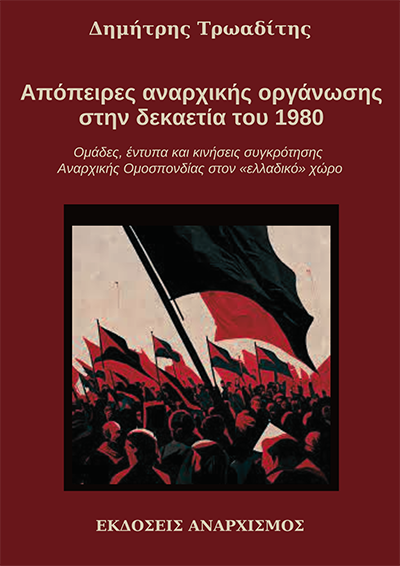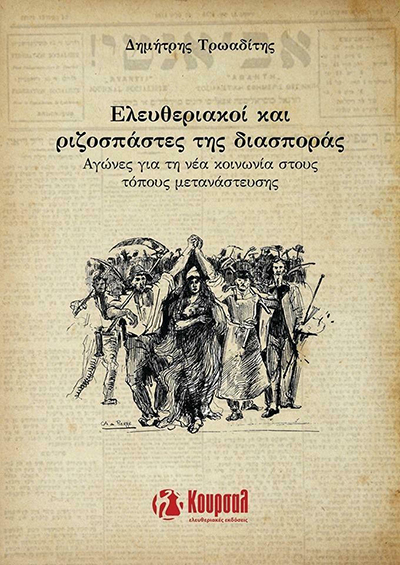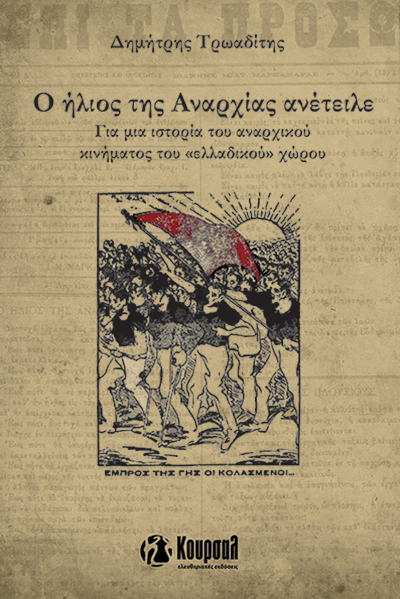- Λεπτομέρειες
- Dimitris Troaditis
- English
Dimitris Karampilias born in the village of Mintilogli Achaia (outside of Patras) in 1872. He was one of the most active anarchists in “Epi Ta Proso” newspaper/collective and the anarchist movement of Patras during 1890's. After the dissolution of the anarchist movement of Patras, moved to Athens together with Giannis Magkanaras where they both participated in the anarchist groups and activities.
In 1901, he settled in Alexandria, Egypt, where he worked as a cigarette maker and participated in the labor and anarchist movement, collaborating with Greek and Italian anarchists who had been settled there before him.
We do not know the exact time of his departure from Egypt. In France, where he went, he worked as a tailor and became involved in the anarcho-syndicalist movement. Allegedly he come together with other Greek anarchists who lived and were active in France (although we do not know names and how many they were), while some information want him to work in the printing of the anarchist magazine «Les Temps Nouveaux» edited by Jean Grave. He rather became a member of the General Confederation of Labour (CGT), founded in 1906 in Amiens and at that time was more syndicalist and had not gone under complete marxist control. But shortly before the outbreak of World War I an internal fighting broke out in the organisation due to the adoption by the leadership of patriotic rather than internationalist positions and the anarchists and anarcho-syndicalists members gradually began to withdraw. Thus, it appears that Dimitriss Karampilias left CGT in a bitterness and with his French companion Louise-Melanie Pierette, returned to Greece during 1913-1914 and settled in his homeland Patras, where he continued to work as a tailor, while his companion was giving French language lessons.
By some information Karampilias during the period of the Greek military campaign in Asia Minor actively involved in the anti-war propaganda. The same information say that in the elections of 1920 (which turn to be a referendum against the war), he was urging people to vote for the Sosialistiko Ergatiko Komma Elladas (SEKE – Socialist Workers’ Party of Greece – the predecessor of the Greek Communist Party) which during this time had adopted a clear anti-war program. If we consider the fact that during those years many anarchists were founders of communist and socialist parties believing that they may have a revolutionary potential and also that the same time, and also that one of the primer organizers of SEKE in Patras was Stelios Arvanitakis, who shortly after became an anarchist communist, maybe this information is not so wrong. However, from what we know Karampilias neither appear been a member of SEKE nor he involved in any organized socialist or other similar movement or activity in Patras up until 1945. The local well-known left trade unionist Haralampos Ploskas, said in early 1980 that during1930's Karampilias was the only anarchist in Patras.
In 1928 a publisher with the name Leon Panayotou published in Patras a book by someone B....
- Λεπτομέρειες
- Dimitris Troaditis
- English
In 1893 Socialistiki Adelfotita (Socialist Brotherhood) founded in Patras, which was not a coherent organisation, but a loose grouping of some socialists and progressives, many of whom were friends and followers of the famous Greek socialist of this time Plato Drakoulis. By some historians, Socialist Brotherhood was allegedly a continuation of the Democratic Club in 1870s.
Brotherhood’s president was Vasilis Doudoumis (a lawyer who among other things, wrote some revolutionary poems), secretary was the teacher Charilaos Dimitropoulos, and one of the leaders of the organisation was the architect Aristotle Thales, who came from Alexandria in Egypt.
Apart from Plato Drakoulis’...
- Λεπτομέρειες
- Dimitris Troaditis
- English
The first trade union in Egypt under the name Brotherhood of Workers founded in 1872 by Greek workers, most of which came from the island of Corfu.
The first anarchist publication in Egypt appeared in Alexandria, probably in 1877 with the title «Il Lavoratore» («The Worker") in Italian language.
In September 1878, Errico Malatesta leaves Naples to avoid internment. He goes to Alexandria, Egypt where there is a thriving community of Italian workers. Meanwhile, after King Umberto I assumes the throne of Italy, the republican Passamante unsuccessfully attempts to assassinate the new king. There is widespread repression throughout Italy, in...
- Revolutionary syndicalism and organization
- 1941-1945: Andartiko - the Greek Resistance
- Socialist, anarchist and revolutionary movements in Patras in 1880s
- The Democratic Association of People in Patras and the newspaper “Hellenic Democracy”
- Stavros Kouchtsoglous - A Greek anarchist communist with anarchosyndicalist ideas
- Social radicalism in Greece - Part 1: Reformists - Utopians – Anarchists
- Greece: War and Civil War
Στο κτήριο της Ελληνικής κοινότητας της Μελβούρνης στις 18/07/2019
Με τον Ελευθεριακό στο Αυτοδιαχειριζόμενο Στέκι Πέρασμα, 22/01/2018




